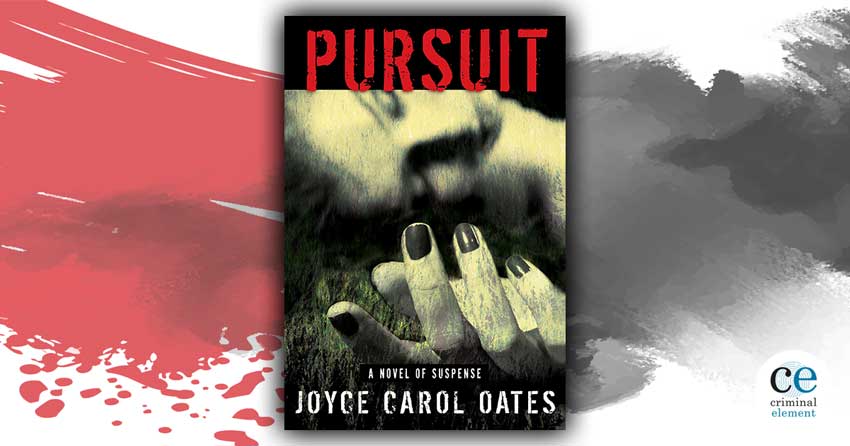Book Review: Pursuit by Joyce Carol Oates
By Thomas Pluck
September 18, 2019
Pursuit by Joyce Carol Oates is a novel of suspense about a newly married woman forced to confront the dark secrets of her past when the recurring nightmares from her childhood return.
The prolific talent of Joyce Carol Oates is legendary, as is her ability to write from the perspective of the diseased male mind, like in the stunning Dahmeresque novel, Zombie, among others. That diseased male mind is the toxic center of Pursuit, a fairy-tale confection about a sweet marriage between virginal young naïfs and the secret Abby cannot face—or tell.
The setup teases you with hints of the supernatural. But has Oates ever written of the supernatural when the unnatural inventions of the twisted human mind are more terrifying than any imagined bugaboo that lurks outside the light of the home fires? No, she consistently reveals to us what we don’t want to believe—that the calls are always coming from inside the house, and the dangers lurking inside the walls of home are more dangerous than the “other” we are trying to demonize and keep out.
As a child, Abby had the same recurring nightmare night after night, in which she wandered through a field ridden with human skulls and bones. Now an adult, Abby thinks she’s outgrown her demons until, the evening before her wedding, the terrible dream returns, forcing her to confront the dark secrets from her past that she has kept from her new husband, Willem. The following day—less than 24 hours after exchanging vows—Abby steps out into traffic. As his wife lies in her hospital bed, sleeping in fits and starts, Willem tries to determine whether this was an absent-minded accident or a premeditated plunge, and he quickly discovers a mysterious set of clues about what his wife might be hiding. Why is there a rash-like red mark circling her wrist? What does she dream about that causes her to wake from the sound of her own screams?
Pursuit’s title is a red herring; the story is of a pursuit and capture, but it is not the one we are led to believe, that Willem is hunting Abby’s secrets. He is a diligent caregiving husband, selfless and more concerned with her recovery than interrogating her to learn whether she was trying to kill herself. He is a good if simple man; just as she is a good and simple woman, a volunteer at a home for the deaf. But she is haunted by memories that may as well be an evil spirit bent on her destruction.
Did you think you could escape us?
Not knowing at first where she is or what time this is, for in the terrible dream she is very young and in a place not this in that long-ago time.
This self she has carefully constructed as an adult among the adults of the world—this being does not yet exist in the dream. In the dream there is only the child-self, her truest self, unprotected, as a newborn deer is unprotected, lacking even a scent.
One of Joyce Carol Oates’s greatest skills is her ability to return to the childhood mind. Like many writers, she was an observant child, according to her memoir, The Lost Landscape. In childhood, we are all alien anthropologists, learning the strange folkways of the world of adults. Abby and Willem are both innocent like children; virgins both, her due to the traumatic childhood that has made her punish herself with guilt, and he due to his religious upbringing, so pure he doesn’t even repeat locker-room talk and lusts for marriage so that he can have sex sanctioned by God.
The meat of the novel is the story of the adults. The “mommy-skull” and the “daddy-skull” from her nightmares come to life, and we have to decide whether this is what truly happened or if it is the fever-dream of her damaged brain spinning like an unsprung clock to heal itself after her near-death experience. It is common enough, a war-scarred man coming home changed, destroying his family with drink and jealousy. Emasculated by his wife’s lies, he avenges his honor in a murder-suicide that chains them together in death, and only little Abby escapes.
The father waiting outside the home he can no longer enter:
The injustice of it—his predicament, his life—sweeps over him like a torrent of scalding steam. That he has been banned from his own house under the terms of a “separation” to which he’d agreed only reluctantly, under duress—that his only, beloved child is a few yards away from him inside the house, in the care of a hostile stranger.
[…]
All Daddy wants is a hug, a fleeting kiss. All Daddy wants is to know he is loved.
We spend a lot of time inside the head of the aggrieved father on his crusade to punish the wife who he is sure has betrayed him, and his pursuit of his prey is mirrored by Willem’s pursuit of Abby’s secret, as he forces her to confront what she cannot face. Because Abby is defined by her secret, we compare his “saving” of her to the murder-suicide that made her. Together forever. Shackled for life. The ring around her wrist, is it stigmata? Sympathetic pain after seeing the handcuffs on the bones in her nightmares? Or has she rubbed her wrist raw with guilt?
The mystery is deep, and our fairy-tale prince and princess have a long journey to defeat the monsters that haunt her so she can be free. In Pursuit, we see the modern horror of aggrieved men committing murder-suicide as the atrocity behind a fairy-tale archetype of the sleeping beauty, woken by a kiss, saved by a man who believes her.
